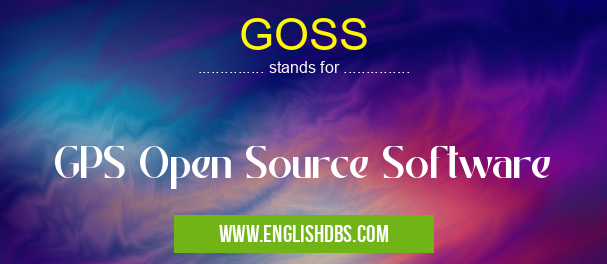What does GOSS mean in SOFTWARE
GOSS is a free and open-source software suite for developing and testing GPS (Global Positioning System) receivers and applications. It provides a range of tools for GPS signal analysis, simulation, and visualization.

GOSS meaning in Software in Computing
GOSS mostly used in an acronym Software in Category Computing that means GPS Open Source Software
Shorthand: GOSS,
Full Form: GPS Open Source Software
For more information of "GPS Open Source Software", see the section below.
- GOSS (GPS Open Source Software) is a set of open-source software tools and libraries used for the development, analysis, and operation of GNSS (Global Navigation Satellite Systems) applications.
- It provides a comprehensive framework for GNSS-based positioning, navigation, and timing applications.
Features of GOSS
- Open source and freely available
- Supports multiple GNSS constellations (GPS, GLONASS, Galileo, BeiDou)
- Provides a modular architecture for easy integration into different applications
- Includes tools for signal processing, navigation algorithms, and performance evaluation
- Supports real-time and post-processing applications
Applications of GOSS
- Development of GNSS receivers and navigation devices
- Analysis and simulation of GNSS signals and systems
- Performance evaluation of GNSS technologies
- Education and research in the field of GNSS
Benefits of using GOSS
- Cost-effective: Open source and free to use
- Flexibility: Modular architecture allows customization to specific application needs
- Transparency: Open source code ensures transparency and understanding of the underlying algorithms
- Community support: Active community of developers and users provides support and resources
Essential Questions and Answers on GPS Open Source Software in "COMPUTING»SOFTWARE"
What is GOSS (GPS Open Source Software)?
What are the benefits of using GOSS?
GOSS offers several advantages, including:
- Open-source and free: GOSS is freely available and open-source, allowing users to modify and extend it as needed.
- Comprehensive toolset: GOSS provides a wide range of tools for GPS signal analysis, simulation, and visualization, covering various aspects of GPS development.
- User-friendly interface: GOSS features a user-friendly interface, making it accessible to users with varying levels of expertise in GPS.
What are the key features of GOSS?
GOSS includes several key features:
- GPS signal analysis: GOSS can analyze GPS signals, providing information about signal strength, modulation, and other parameters.
- GPS simulation: GOSS allows users to simulate GPS signals, enabling testing and debugging of GPS receivers and applications in controlled environments.
- GPS visualization: GOSS provides tools for visualizing GPS data, such as signal plots, satellite constellations, and 3D representations of GPS trajectories.
Who can benefit from using GOSS?
GOSS is suitable for a wide range of users, including:
- GPS receiver developers: GOSS can help developers test and debug GPS receivers.
- GPS application developers: GOSS can assist in developing and testing GPS-based applications.
- GPS researchers: GOSS provides tools for studying and analyzing GPS signals and systems.
- Educators and students: GOSS can be used as an educational tool for teaching about GPS concepts and applications.
How can I get started with GOSS?
To get started with GOSS:
- Visit the GOSS website (github.com/goss-project/goss) to download the software.
- Install GOSS on your computer according to the installation instructions.
- Refer to the GOSS documentation and tutorials to learn about its features and usage.
- Join the GOSS community forum or mailing list for support and discussions.
Final Words: GOSS is a valuable open-source resource for the development and deployment of GNSS applications. Its comprehensive features, modular architecture, and community support make it a preferred choice for GNSS enthusiasts and professionals alike.
